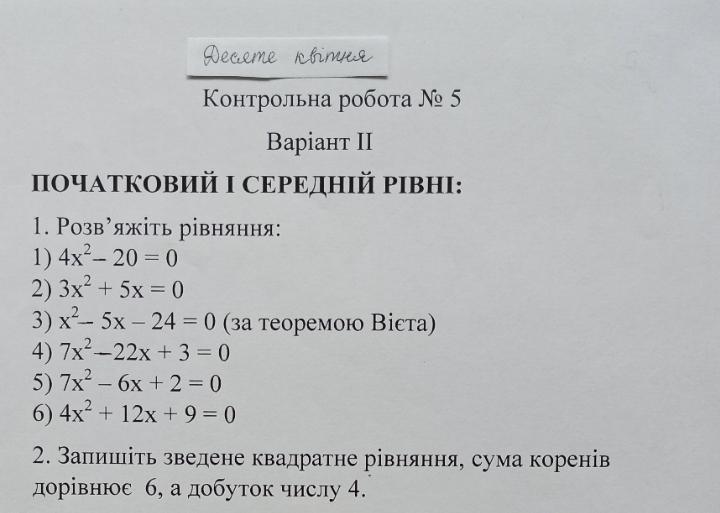-
СРОЧНО СРОЧНО НАДО СЕГОДНЯ РЕШИТЬ КОНТРОЛЬНУЮ ДАЮ 5 ЗВЁЗДЫ

Ответы 1
-
Ответ:
4x² - 20 = 0 => 4x² = 20 => x² = 5 => x = ±√5
3x² + 5x = 0 => x(3x + 5) = 0 => x = 0 or x = -5/3
(x-2)(x-5) > 0 => x ∈ (-∞, 2) ∪ (5, ∞)
7x² - 22x + 3 = 0 => x = (22 ± √(22² - 473)) / (2*7) => x₁ ≈ 0.42, x₂ ≈ 3.15
7x² - 6x + 2 = 0 => x = (6 ± √(6² - 472)) / (2*7) => x₁ ≈ 0.49 + 0.37i, x₂ ≈ 0.49 - 0.37i
4x² + 12x + 9 = 0 => x = (-12 ± √(12² - 449)) / (2*4) => x = -1.5
Let's assume the quadratic equation is ax² + bx + c = 0.
According to the problem, we have:
sum of the roots = -b/a = 6
product of the roots = c/a = 4
Using these two equations, we can express b and c in terms of a:
b = -6a and c = 4a
Substituting these values in the quadratic equation, we get:
ax² - 6ax + 4a = 0
Dividing both sides by a (assuming a is not equal to 0), we get:
x² - 6x + 4 = 0
This is the required quadratic equation
-
Автор:
ryliegwoo - 2 года назад
-
7
-
-
Добавить свой ответ
-
З одного міста одночасно в одному напрямі вирушилИ вантажівка та легковик. Коли вантажівка проїхала 192 км, легкова машина проїхала 288 км. Швидкість вантажівки 64 км/год. Знайди швидкість легковика.Срочно будь ласка
-
Предмет:
Математика -
Автор:
jaida - 2 года назад
-
Ответов:
1 -
Смотреть
-
- Почему сотрудники рентген-кабинетов при работе пользуются перчатками, фартуками и очками, в которых введены соли свинца? Свинец и соли свинца испускают вредные лучи. Свинец и соли свинца поглощают рентгеновские лучи. Свинец и соли свинца испускают полезные лучи. Свинец и соли свинца не поглощают рентгеновские лучи. Проверить
-
Друзі допоможіть будь ласка мені дуже треба зараз буде урок а я не готова !!ПРОШУ ВАС лаю 66 балов !!!!!
-
Предмет:
Английский язык -
Автор:
madalynstanley - 2 года назад
-
Ответов:
1 -
Смотреть
-
-
Первоначальная цена -? После уценки на 10% от первоначальной цены Цена стала -72 900тг Неизвестно перво.цена
-
Предмет:
Математика -
Автор:
stephaniejordan - 2 года назад
-
Ответов:
1 -
Смотреть
-
